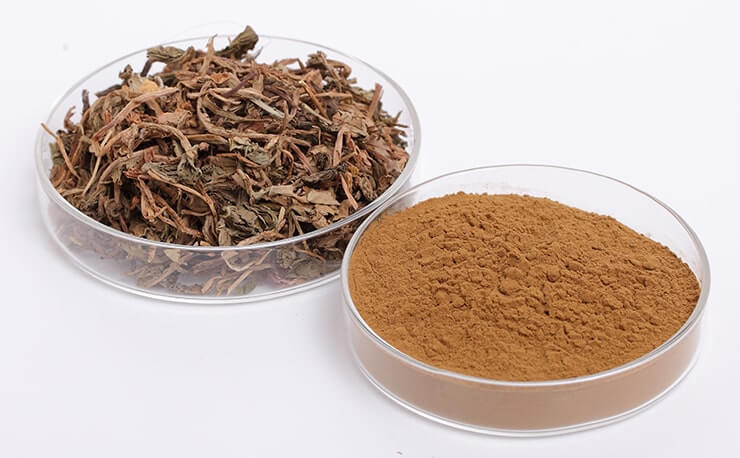The dandelion Herba Taraxaci extract (Taraxacum officinale Weber) is a plant whose medicinal use has been documented since the beginning of the eleventh century, through the writings of Persian doctors of such deserved fame as Ibn Sina, better known as Avicenna, and his predecessor Al-Razi or Razí, to whom the current “Razi Medical Research Institute”, located near Tehran (Iran), owes its name.
WHAT YOU SHOULD KNOW…
- It is an herbaceous plant whose roots and leaves are used as a natural medicine for digestive disorders.
- It began to be used to stimulate the production of bile and urine.
- The capsules of powder or Herba Taraxaci extract of dandelion can be taken with an infusion of these plants
Plant
The dandelion is a herbaceous plant, belonging to the family of the compound, which usually does not grow beyond 35 cm high. It has a short and quite branched, conical rhizome with a bittersweet taste. Its leaves (bitter when grown) are deeply toothed and form a rosette at the base from which the floriferous stems that are hollow and erect grow, ending in a yellow floral chapter.
CURIOSITIES ABOUT HIS NAME
The name dandelion with which it is popularly known in almost all languages is due to the shape of its trimmed leaves, similar to sharp and curved teeth. However, other names with which it is also known to refer to its properties. Thus, the Spanish taraxacón or the Italian Tarassaco comes from its name in Latin Taraxacum which means “to remove” and refers to its mildly laxative properties. In French, it is known as pis-en-lit, alluding to its diuretic properties, since the tender leaves of the dandelion are edible and very pleasant in the salad. In times of scarcity, they constituted an important part of the feeding at the beginning of the spring and it is said that the children who ate a lot of dandelion urinated in bed due to its diuretic effect.
Its use in the past
Herba Taraxaci extract is used to stimulate the production of bile and urine. In the sixteenth century, its use was consolidated and its diuretic properties resulting from increasing the production of urine, and its double action on the liver are described: on the one hand, it stimulates the production of bile (choleretic effect) and, on the other, it’s emptying from the gall bladder to the duodenum, facilitating the digestion of fats. This double effect on the liver and kidney and its mildly laxative action make the Herba Taraxaci extract a useful element.
How is it currently used?
Herba Taraxaci extract is indicated in the monograph of the European Medicines Agency (EMA) as a traditionally used medication (MTP) for mild digestive disorders (such as the feeling of fullness in the abdomen, flatulence, and slow digestion) and to increase the amount of urine and clean the urinary tract and kidneys. Because of its bitter taste, it also has an appetizer effect and can be used to whet the appetite.
How to take it?
It can be taken in tisane, fluid extract (drops), or capsules of powder or dry extract, either from the leaves, the root, or a mixture of both.
- Generally, if the root is the dose is the equivalent of 3-5 g, up to three times a day.
- In the case of leaves, the equivalent of 4 to 10 g, up to three times a day.
- In the case of a mixture of root and leaves 3.5 – 7.5 g, up to three times a day.
For fluid extracts (drops) and capsules of powder or dry extract, it is recommended to follow the instructions of the manufacturing laboratory.
Contraindications, adverse effects, and recommendations
Herba Taraxaci extract should never be used in case of biliary problems without the supervision of a doctor and is contraindicated in case of obstruction of the bile ducts. Because it contains bitter substances, Herba Taraxaci extract stimulates the production of gastric juice so that certain people can cause gastric discomfort and hyperacidity. To avoid this problem, a plant with mucilages such as marshmallow can be added to the infusion mixture, and in the case of taking a liquid preparation, the drops can be added to an infusion of mauve or marshmallow. The capsules of powder or dry extract of dandelion can also be taken with an infusion of these plants.
NOTE THAT…
Herba Taraxaci extract preparations should not be taken if for any reason the production of gastric juices should be reduced or if antacid medicines are taken.
Herba Taraxaci extract can increase the effect of some medications such as diuretics, anticoagulants, and neuromuscular blockers, so in the case of taking medications, it is recommended to consult the doctor or pharmacist about the convenience or not of taking Herba Taraxaci extract.








